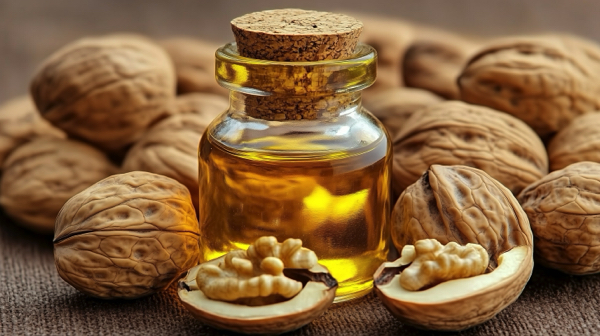Walnut oil: One of the best nut oils for your heart and brain
05/26/2025 / By Laura Harris

- Walnut oil is packed with omega-3 and omega-6 fatty acids and antioxidants like vitamin E and polyphenols — nutrients that allow it to support heart, brain and skin health.
- Most commercial walnut oils are heavily refined or hydrogenated and are thus stripped of most of their nutritional benefits. Cold-pressed, organic options retain maximum health value.
- Conventional walnuts are heavily contaminated with pesticides and can absorb heavy metals. Choosing organic walnut oil minimizes exposure to these toxic elements and ensures purity.
- Walnut oil is best used for dressings, drizzling or dips. Avoid high-heat cooking to preserve nutrients and flavor.
- Used since ancient times for food and medicine, walnut oil adds a nutty depth to salads, roasted veggies, pesto and desserts.
Walnut oil is a hidden gem in the world of culinary oils. Extracted from English walnuts (Juglans regia), this amber-colored oil boasts a rich, nutty flavor that enhances dishes while delivering nutrients. Its abundance of healthy fats, antioxidants and vitamins has made it a prized ingredient in both gourmet cooking and traditional medicine. However, not all walnut oils are created equal – processing methods and sourcing dramatically impact its health benefits.
Brief history of walnut oil
Walnuts have been cultivated for thousands of years. Evidence of their use for various purposes can be traced back to ancient Persia, Rome and China. Historically, walnuts were pressed for their oil, which was not only consumed as food but also used in lamps, cosmetics and medicinal remedies.
In medieval Europe, walnut oil was a staple in French cuisine and was used especially in dressings and sauces. It gained wider recognition in the 19th century as cold-pressing methods improved, making high-quality walnut oil more accessible. Today, France remains one of the largest producers of premium walnut oil, though it is also widely produced in California, China and other walnut-growing regions.
Nutritional benefits of walnut oil
Walnut oil is celebrated for its exceptional fatty acid and antioxidant composition:
Omega-3 and omega-6 fatty acids
- Contains alpha-linolenic acid (ALA), an essential omega-3 fatty acid that’s crucial for brain health and reducing inflammation.
- Has a balanced ratio of omega-6 to omega-3 (about 4:1), which is healthier than many refined vegetable oils.
Vitamin E (tocopherols and tocotrienols)
- A powerful antioxidant that protects cells from oxidative damage.
- Promotes skin health and may slow aging.
Polyphenols and phytosterols
- Polyphenols reduce inflammation and support cardiovascular health.
- Phytosterols help lower LDL (“bad”) cholesterol.
Minerals
- Traces of magnesium, phosphorus, zinc and potassium contribute to optimal metabolic function.
Is walnut oil healthy or harmful?
Walnut oil is undoubtedly nutritious, offering an abundance of omega-3 and omega-6 fatty acids and natural antioxidants especially when cold-pressed, as this method best preserves its beneficial properties. (Related: Research consistently finds walnut oil effective against Type 2 diabetes.)
However, its health impact largely depends on quality and processing.
Many commercial walnut oils undergo high-heat extraction and chemical refining, which strip away vital nutrients. Additionally, some brands hydrogenate the oil to prolong shelf life, potentially creating unhealthy trans fats, while others dilute it with cheaper vegetable oils, reducing its nutritional value.
For those seeking maximum health benefits, choosing cold-pressed, organic walnut oil, preferably stored in dark glass bottles to prevent oxidation, is ideal.
Walnuts are among the most pesticide-heavy tree nuts, frequently treated with fungicides and insecticides such as chlorpyrifos and bifenthrin. Opting for organic walnut oil helps minimize exposure to these harmful pesticide residues.
Additionally, walnuts can absorb toxic heavy metals like cadmium and lead from contaminated soil, further underscoring the importance of choosing organic and lab-tested brands that carry certifications for purity and safety.
By selecting organic walnut oil, you not only reduce chemical exposure but also support farming practices that prioritize environmental and long-term health benefits.
Culinary uses of walnut oil
Walnut oil’s delicate flavor makes it ideal for finishing dishes rather than high-heat cooking (smoke point is ~320 F or 160 C).
Best used in:
- Salad dressings – Paired with balsamic vinegar, mustard and honey.
- Drizzled over roasted vegetables – Especially squash, beets or Brussels sprouts.
- Dipping oil – Mixed with herbs and bread.
- Pesto alternative – Combined with basil, garlic and Parmesan.
- Desserts – Adds depth to chocolate mousse or ice cream toppings.
Recipe ideas
- Walnut oil vinaigrette – Whisk with lemon juice, Dijon and sea salt.
- Herb-infused walnut oil – Warm gently with rosemary and thyme (store for later use).
- Walnut-crusted salmon – Brush fish with walnut oil before baking.
This story is not medical advice and is not intended to treat or cure any disease. Always consult with a qualified naturopathic physician for personalized advice about your specific health situation or concern.
Visit NaturalNews.com, an excellent resource for related articles about health and nutrition. This platform allows you to explore the world of superfoods and uncover their many health benefits.
You can also try Brighteon.ai, an AI model created by Mike Adams, also known as the Health Ranger. This model is available as a free download to be run locally and is designed to help share and decentralize knowledge. By doing so, it aims to bypass censorship and empower people with knowledge.
For a platform that champions uncensored video content and free speech, particularly for discussions on nutrition, natural medicine, ingredients and related topics, check out Brighteon.com, a website that offers a space for open dialogue and exploration of these subjects without restrictions.
Lastly, you can try Brighteon.IO and Brighteon.social, two free speech-focused social media platforms where users can openly discuss topics such as health, nutrition, ingredient safety, toxicity and related subjects without fear of censorship. These platforms aim to provide a space for unrestricted dialogue on critical issues.
Watch this video to learn about the 10 incredible benefits of walnut oil for skin, hair and health.
This video is from the Daily Videos channel on Brighteon.com.
More related stories:
Research shows Mexican walnut can protect the kidneys from ischemic injury.
Eating walnuts and walnut oils slashes heart disease risk by improving multiple biometrics.
Sources include:
Submit a correction >>
Tagged Under:
brain health, food is medicine, food science, functional food, grocery, health science, healthy fats, heart health, ingredients, natural health, nut oils, nutrients, nutrition, nuts, omega 3, organics, walnut oil
This article may contain statements that reflect the opinion of the author
RECENT NEWS & ARTICLES
HealthScience.News is a fact-based public education website published by Health Science News Features, LLC.
All content copyright © 2018 by Health Science News Features, LLC.
Contact Us with Tips or Corrections
All trademarks, registered trademarks and servicemarks mentioned on this site are the property of their respective owners.




















